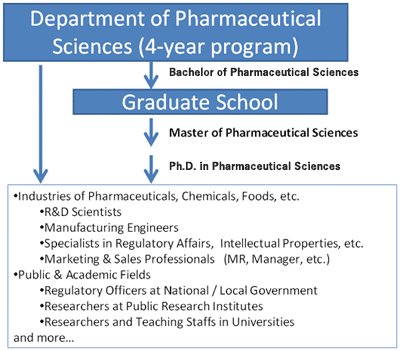Department of Pharmaceutical Sciences
(4-year program)
Fostering Pharmaceutical Researchers to Be Instrumental in a Wide Range of Fields, Including Drug Discovery, Clinical Development, an Environmental and Life Sciences
The Department of Pharmaceutical Sciences fosters pharmaceutical researchers who can play active roles in a wide range of fields, including drug discovery, clinical development, and environmental and life sciences. However, it is no simple task for students who complete the undergraduate program to immediately apply their training as full-fledged researchers in the real world; the period of their studies may thus be regarded as a time to lay the foundations for becoming a researcher. Accordingly, many students go on to enroll in graduate school upon completion of the undergraduate program.
The Faculty of Pharmacy and the Graduate School of Pharmaceutical Sciences at Keio University work closely together. The first half of the six-year program, which includes a master's degree, is spent acquiring an array pf knowledge and skills related to pharmaceutical science, including drug discovery and life sciences. The second half is meanwhile dedicated to developing researcher literacy and the ability to identify problems and find solutions. Additionally, from the beginning of the program, students become conversant with the rules and regulations that a researcher is expected to understand, and cultivate a sense of responsibility and ethical perspectives on the public good throughout the course of their studies.
Core Studies
Immediately after admission, students focus on the areas that will form the foundation of their education in pharmaceutical science, such as physical and analytical chemistry, organic chemistry, and life science. This is accomplished not only through lectures, but also via engaging in hands-on experiments and observations.
Professional Education
After completing their core studies, students learn about the pathogenesis of diseases, the effects of drugs used, dosage calculations, dosage forms, and other information deeply connected to drugs. Students also study subjects related to the environment, public health, and food and nutrition.
Graduation Thesis Research
The second half of the curriculum focuses on research in the laboratory for the graduation thesis. Students work with an academic advisor to tackle research tasks. At the end of the fourth year, students write their graduation thesis and present their research at a conference. For students who plan to go on to graduate school, it is treated as an interim presentation.
Career Prospects
About 90% of students go on to the master's program, where they dedicate further time and effort to honing their skills as researchers. Acquiring a Ph.D. further unlocks their potential paths in the increasingly globalized fields of pharmaceutical R&D and the life sciences. For this reason, Keio University highly encourages students to enter the doctoral program after completing their master's degree.



